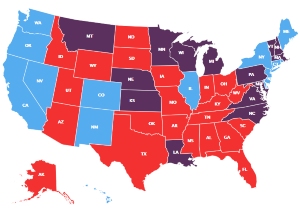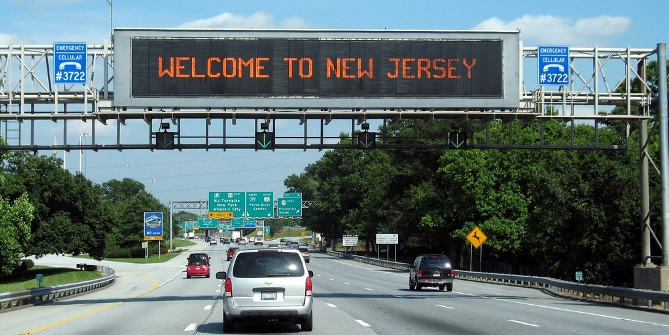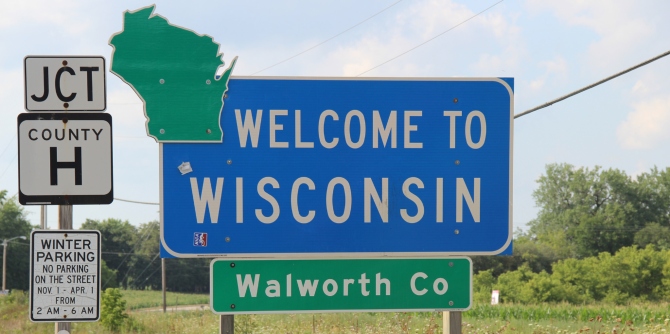 Republican voters in Kentucky went to the polls last week in a gubernatorial primary ahead of the general election in November. With the results of the primary on a knife edge of only 83 votes between the winner, Matt Bevin and the 2nd placed candidate, James Comer, the latter has requested a recanvas to contest the vote count. Anne Cizmar writes that the primary has been beset by allegations of domestic violence towards Comer and negative ads towards Bevin. Whoever wins the primary fight will face a tough battle to beat the Democratic nominee, Jack Conway, in a state which has tended to return Republicans to national office, but Democrats to the governor’s mansion.
Republican voters in Kentucky went to the polls last week in a gubernatorial primary ahead of the general election in November. With the results of the primary on a knife edge of only 83 votes between the winner, Matt Bevin and the 2nd placed candidate, James Comer, the latter has requested a recanvas to contest the vote count. Anne Cizmar writes that the primary has been beset by allegations of domestic violence towards Comer and negative ads towards Bevin. Whoever wins the primary fight will face a tough battle to beat the Democratic nominee, Jack Conway, in a state which has tended to return Republicans to national office, but Democrats to the governor’s mansion.
The Kentucky Republican gubernatorial primary has been called one of the nastiest primaries in recent years—and the election fights will drag on for at least another week. After the election results poured in last Tuesday, Matt Bevin and James Comer each had 33 percent of the vote, with Bevin just 83 votes ahead of Comer. Two other candidates—Hal Heiner and Will Scott—received 27 percent and 7 percent of the vote, respectively. Comer is contesting the election and asking for a “recanvass.”
Under Kentucky law, candidates can seek a “recanvass” by filing a request with the Secretary of State. Under the recanvass, election officials will review the voting results to check for any anomalies in the vote totals transmitted to the State Board of Elections. If past election recanvass requests are any indication, Comer will not receive the 83 votes needed from the recanvass scheduled for May 29th. Comer will then have the option to request a full recount of the votes. In order to start a recount, Comer would have to file a request with the Franklin County Circuit Court (county where Frankfort, Kentucky is located—the capital city of Kentucky), and a Kentucky judge would oversee the recount procedure. The recount could last for weeks, continuing what has been a nasty primary for the Republicans.
James Comer is the current Kentucky Agricultural Commissioner, winning handily in 2011. Before that he served as a State Representative and is a career farmer. Comer ran on the slogan “Real Conservative Leadership for All Kentuckians” and platform stances of protecting gun ownership and coal jobs, and cutting taxes and the cost of higher education. In his advertisements, he touted his conservative credentials and that he “fought back against Barack Obama and won”. He painted himself as both an economic and social conservative, although he wants to focus on economic policies, taxes, and jobs.
During the campaign, Comer’s ex-girlfriend, Marilyn Thomas, came forward with abuse allegations. Thomas claimed that Comer abused her while they were in college, and took her to obtain an abortion. Comer denied all of the allegations and questioned the timing—the allegations came just two weeks before the primary election when the Comer campaign was polling strong. Comer subsequently ran a TV ad accusing Heiner of “gutter politics.”
Heiner was polling well in the race up to when the abuse allegations surfaced. Although the Heiner campaign is not directly implicated in bringing the abuse allegation to light, the campaign did apologize for contact with a blogger who had been writing about the abuse allegations since last summer. In response to Comer’s “gutter politics” ad, Heiner in turn ran an ad criticizing the responses of Comer and Bevin for not standing up for the woman who alleged abuse and those who came forward.
The candidate 83 votes up—Matt Bevin—managed to stay silent on the Comer-Heiner abuse allegations, possibly helping push him to victory at the end. Bevin jumped in to the race for governor right before the filing deadline four months ago. Bevin gained statewide recognition last year as the primary challenger against Mitch McConnell—Kentucky’s senior U.S. Senator, and current Senate Majority Leader. Bevin’s campaign slogan this time was “Fresh Ideas—Conservative Values” and he also touted his conservative credentials.
Bevin was also subject of negative advertisements as well, similar to the ones levied against him during the 2014 U.S. Senate primary when he ran against McConnell. The claims against Bevin included that he accepted government money for his business, and was behind on his taxes. However, the claims against him were refuted by the media.
It seems likely that Bevin will hold on for the victory. But whichever Republican wins the nomination, he will be facing off against Democratic candidate Jack Conway in November, who easily won his primary race with 79 percent of the vote. Conway is the current Attorney General in Kentucky, and has served in that position since 2008, having been re-elected in 2011. During his time as Attorney General he has made headlines for refusing to promote Kentucky’s gay marriage ban in court, against the wishes of the current Democratic governor Steve Beshear.
At this point, it is hard to say whether Conway or the Republican will be victorious in November. In recent years, Kentucky has trended more Republican. The last time a U.S. presidential candidate won Kentucky’s 8 electoral votes was in 1996 when Bill Clinton faced off against Bob Dole—and even Clinton only won by about 1 point during that election. In the the U.S. House of Representatives, 7 of 8 Kentucky members are Republican, the one lone Democrat (John Yarmuth) representing the Louisville area. Both of Kentucky’s U.S. Senators are also Republicans. Even at the state level, Kentucky Democrats have seen their margin in the Kentucky House of Representatives slipping in recent years. In 1994 Democrats held a 71 to 29 majority advantage in the House; after the 2014 election Democrats hold a dwindling 54 to 46 advantage.
Still, current Governor Steve Beshear has been relatively popular over his two terms in office, and is leaving office because of term limits. His poll ratings last year show that a majority of Kentuckians approve of his job in office, even though they dislike the Affordable Care Act (aka Obamacare), which he has promoted. Democrats also have done historically well in gubernatorial elections, despite Kentucky’s increasingly Republican voting for national office, holding the top executive spot for all but 4 years since 1971.
The competitive Republican gubernatorial primary, recent Kentucky voting trends, and negative campaigning indicate that the Kentucky 2015 gubernatorial race is likely to be noteworthy right to the end.
Featured image credit: CGP Grey (Flickr, CC-BY-2.0)
Please read our comments policy before commenting.
Note: This article gives the views of the author, and not the position of USApp– American Politics and Policy, nor of the London School of Economics.
Shortened URL for this post: http://bit.ly/1FddQRC
_________________________________
 Anne Cizmar – Eastern Kentucky University
Anne Cizmar – Eastern Kentucky University
Anne Cizmar is currently an Assistant Professor at Eastern Kentucky University. Her research has been published in journals such as Political Research Quarterly and Political Communication. She is currently working on a project related to presidential campaign rhetoric.















